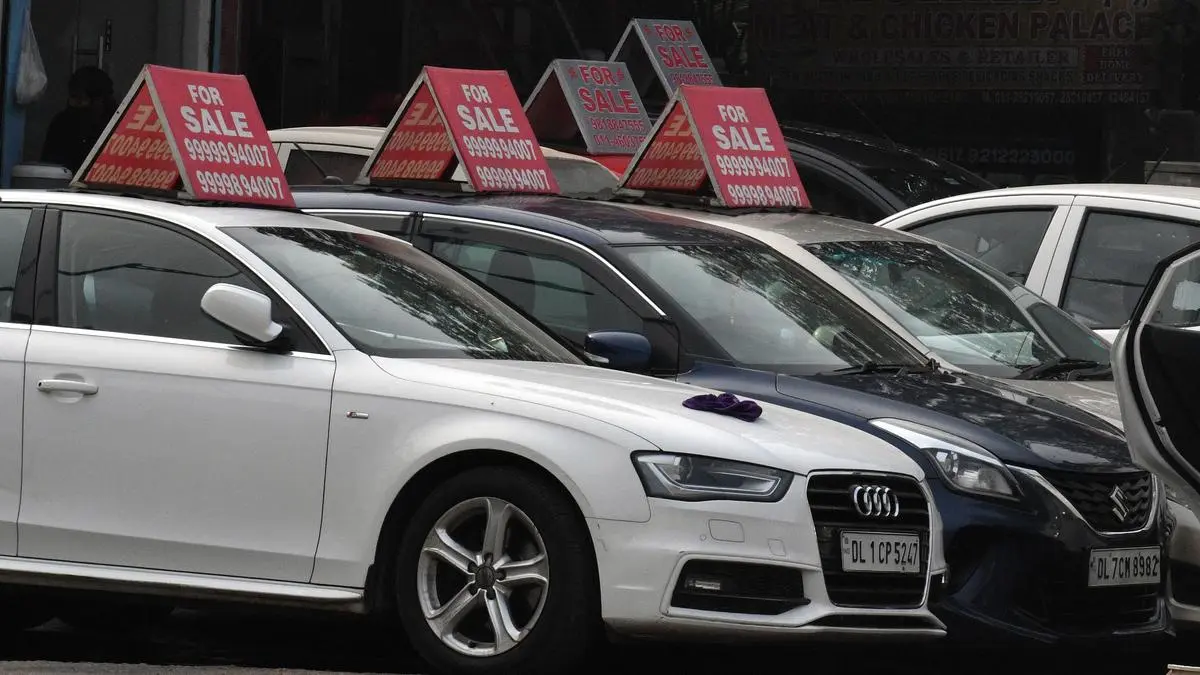(File Photo) With India’s used-car market projected to grow at a 10% CAGR reaching 9.5 million units by 2030, the regulations regarding ownership transfer could be a make or break for the ballooning industry
| Photo Credit:
Kamal Narang
When Disha (name changed) decided to sell her car in 2023, the dealer made her sign blank transfer papers claiming the car will be transferred to their name. Within days she started receiving calls from dubious identities asking her to be present at the local RTO for vehicle transfer. Her Adhaar and PAN card, given to the agency, was also leaked.
Disha’s experience is not new. The recent terror-attack in Delhi, carried out using pre-owned cars, has only highlighted the persistent issue within India’s used-car industry with poor regulations and a slow transfer process resulting in sleepless nights for many sellers.
Speaking to businessline, industry players suggest that while the blast in Delhi may dampen sentiment briefly, it will ultimately heighten public awareness of compliance and transparency, pushing them towards more organised platforms.
“The incident will drive traction towards organised platforms, where verified documentation, full visibility, and a clear ownership chain are part of every transaction,” app-based used car retailer Spinny said in a response to businessline’s query.
It added that organised players often follow a structured system where each transaction is vetted and recorded making documents and details available in real time for authorities, buyers and sellers.
Likewise, a spokesperson from Cars24 said that the company takes full legal and financial responsibility associated with the vehicle from the moment of handover until the RC is transferred to the new buyer.
“We conduct thorough checks and balances on every car before assigning a price range. Over time, we’ve incorporated several learnings into a detailed inspection checklist and strict documentation process. This ensures that when we sell a pre-owned vehicle, the end consumer gets a fully transparent picture of the car’s condition,” said Nitin Kohli, Brand Director, Volkswagen India, on checking of pre-owned vehicles.
However, users businessline spoke to have had different experiences.
“Whether it’s app-based or through local dealers, you are asked to sign a blank form without any seller identity. I continued to get challans, even after the they claim its now registered in their name,” a user told businessline
K Ravishankar, Partner, T S Mahalingam & Sons (TSM) suggests that even though incidents like the Delhi attack have happened earlier, the price-sensitivity of the Indian market continues to nudge customers to un-regulated local dealers who offer better prices.
Ravishankar says that the best mechanism to protect the sellers’ interest is to register all car dealers.
Fragmented Regulation
In 2023, the Ministry of Road Transport & Highways (MoRTH) introduced regulations for the authorisation of used-car dealers. The provisions established a process for dealers of used cars/registered vehicles to obtain an authorisation from the concerned RTO to be recognised as an ‘authorised dealer’.
The spokesperson from Cars24 says that in reality, states are still trailing in the implementation of these provisions with VAAHAN data showing less than 1,500 used dealers are registered across the country,” he said.
“The process was started a few years ago but has not been fully implemented,” Ravishankar says. “In addition, some dealers are against the deemed ownership as if the final sale does not happen in four or five months, the buyers might hesitate as the car has been in the inventory for a long time,” he said.
With India’s used-car market projected to grow at a 10 per cent CAGR, reaching 9.5 million units by 2030, as per the latest edition of the Indian Blue Book developed by Mahindra First Choice and Volkswagen Pre-owned Certified, the regulations regarding ownership transfer could be a make or break for the ballooning industry.
Published on November 14, 2025
